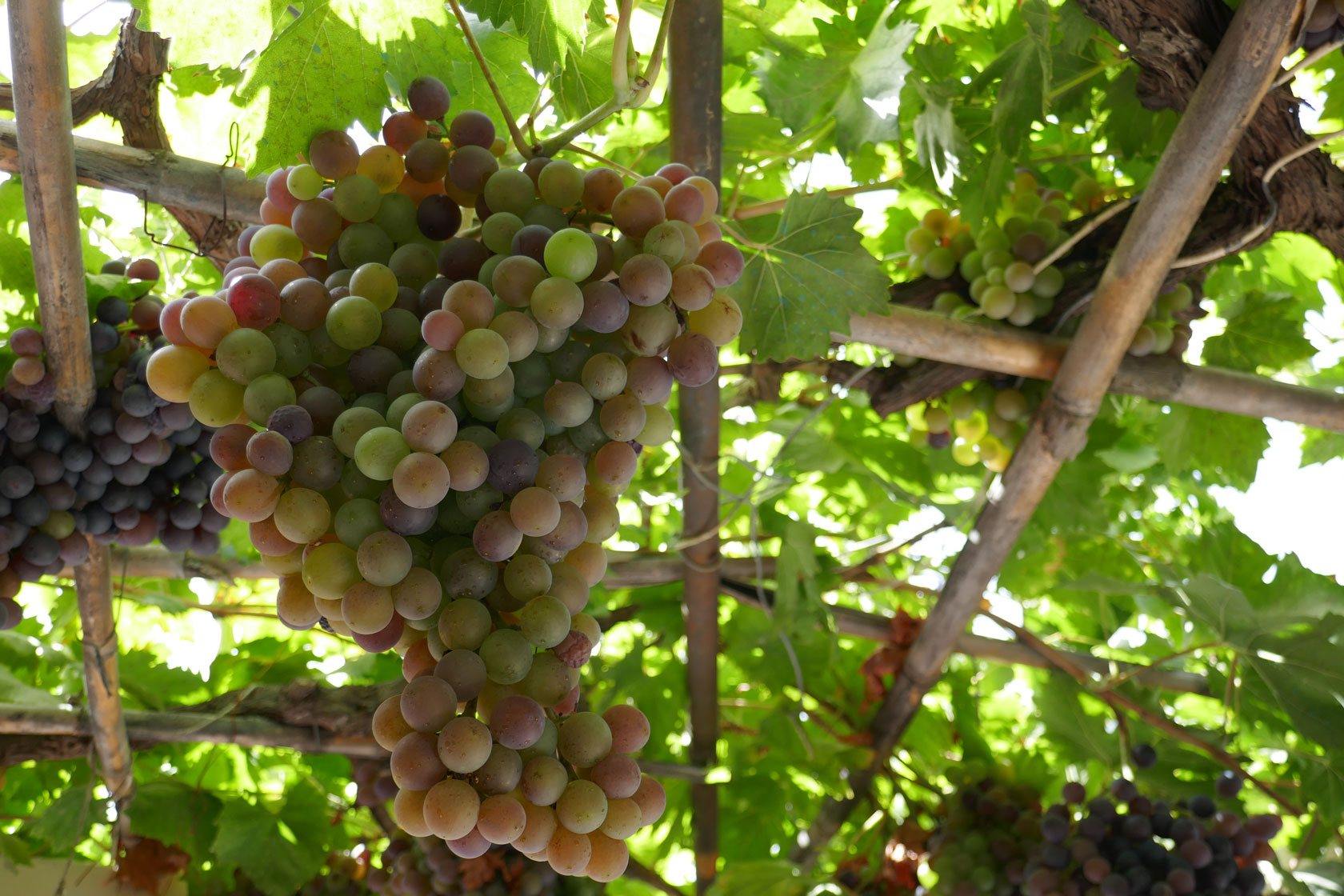Fermenting grapes for thousands for years, Greece serves up unique wines and aromatic spirits.
Wine is deeply entwined in Greece’s history. Well before the Greeks worshipped Dionysus, the god of wine, fertility, festivities, and fun, they were fermenting grapes. In fact, archeologists have found evidence Greeks were producing wines around 6,500 years ago.
In the ancient world, Greek wine was in such demand, it was shipped to markets around the Mediterranean from the Black Sea to Northern Africa to the Iberian Peninsula. Homer not only wrote about wine in his epics, The Iliad and The Odyssey in the 8th century BCE but he may also have been the first to describe modern day wine snobs.
Despite this long and rich heritage, Greece is often better known for popular herb-infused spirits like Ouzo and Metaxa than for its wines. You may have only tasted retsina, a rustic white wine infused with pine resin — and thought it tasted like turpentine. But in recent years, retsina has undergone a bit of a renaissance, with a new generation of winemakers producing quality retsinas that just might surprise you.
Over the years Greece’s wine industry has become more sophisticated. Starting in the 1950’s, Greece set up the Protected Designation of Origin (PDO) to protect and promote its more than 300 native grape varietals. Later, appellation laws were passed to further ensure wines’ origins and quality. As a result, todays Greece’s vintners are bringing the country’s ancient varietals to connoisseurs’ attention and turning them into world-class wines.
As you travel around Greece to see its magnificent archeological sites and its beautiful beaches, it’s also the perfect time to enjoy the country’s distinctive wines. Many of which are hard to find outside of Greece.
To begin your oenophile odyssey, it’s perhaps easiest to envision four distinct wine regions: Northern Greece, Central Greece, Southern Greece, and the Aegean Islands.
If you want to understand how the cult of Dionysus began, venture to Northern Greece with its wetter, cooler climate. In Epirus, Zitsa PDO appellation wineries produce sparkling and still white wines from the local Debina grape that has been cultivated for more than 500 years. This is also where you will discover, north of Epirus, one of Greece’s most respected red wines, Xinomavro, “The Barolo of Greece.” Not to missed as well are Macedonia’s smaller regions of Kavala and Drama that have been famous for wine making for millennia.
On the foothills of Mount Olympus—home of the Greek gods—in Central Greece, you will find vineyards growing grapes blended to create Rapsani a specialty of the region. Often compared to French Rhône blends, Rapsani must be made with equal portions of Inomavro, Stavroto and Krasato grapes. Have a taste to see if you agree that the wine from this moderate weather climate matches those of France.
Southern Greece, including Crete, Peloponnese, Kefalonia and Corfu, enjoys a typical Mediterranean climate. Nemea, a region in Peloponnese, is famous for Aagiorgitiko, a full-bodied red wine similar to Merlot. While Crete has its own native white varietal, Vidiano that produces a medium- to full-bodied fresh wine.
When you think of the arid Aegean Islands — Santorini, Samos, Rhodes, Mykonos, Paros, Limnos among others—you probably picture their beautiful beaches or the white-washed homes and blue-domed churches of Santorini. But you can also taste some amazing local wines as you island hop. Santorini is renowned for its Assyrtiko white wines. Cultivated on this volcanic outcrop more than 3,500 years ago, the grape produces crisp, dry whites with citrusy notes and a slightly salty finish. Think of a flinty Sauvignon Blanc. Assyrtiko grapes also make seductive dessert wines. Santorini’s Vinsanto, made with late-harvest, sun-dried grapes aged in oak, has hints of raspberry, raisin, dried apricot, and maraschino cherry. What better way to taste these wines than at a winery perched on the edge of the island’s volcano?
The nearby island of Samos is famous for its muscat wines. Derived entirely from Moschato Aspro (Muscat Blanc à Petits Grains) grapes, Muscat of Samos wines can be dry or sweet. Samos Vin Doux, a sweet, rich dessert wine, is the most famous. One myth you may hear has it that Dionysus himself taught the people of Samos about winemaking.
Even regions in Greece not noted for their wines serve memorable libations. Corfu, more famous for its stunning beaches, is known for it’s delicious white wines including those from the Theotoky Estate, which had been producing what is considered one of the best in Greece for 150 years.
Curious to learn more and treat yourself to wines fit for the Gods? Sample these unique regional wines on one of Seabourn’s ultra-luxury Mediterranean voyages—choosing a Greek wine can be an epic endeavor, but our knowledgeable sommeliers can help you on your journey of discovering some of the best in Greece—and visit modern wineries to see how they transform ancient grape varietals into world-class wines on a Seabourn excursion.
Consider these upcoming voyages:
7-Day Greece & Dalmatian Delights
DEPARTS: Dubrovnik, Croatia
ARRIVES: Piraeus (Athens), Greece
Jun 14, 2026
from $5,439*
Explore Itinerary*Per Person, USD. Taxes and Fees are included. Additional terms apply.
7-Day Greek Isles & Ephesus
DEPARTS: Piraeus (Athens), Greece
ARRIVES: Istanbul, Turkey
Jun 21, 2026
from $5,524*
Explore Itinerary*Per Person, USD. Taxes and Fees are included. Additional terms apply.
7-Day Turkey & Greek Isle Gems
DEPARTS: Istanbul, Turkey
ARRIVES: Piraeus (Athens), Greece
Jun 28, 2026
from $5,269*
Explore Itinerary*Per Person, USD. Taxes and Fees are included. Additional terms apply.



Consider these upcoming voyages:
7-Day Greece & Dalmatian Delights
DEPARTS: Dubrovnik, Croatia
ARRIVES: Piraeus (Athens), Greece
Jun 14, 2026
from $5,439*
Explore Itinerary*Per Person, USD. Taxes and Fees are included. Additional terms apply.
7-Day Greek Isles & Ephesus
DEPARTS: Piraeus (Athens), Greece
ARRIVES: Istanbul, Turkey
Jun 21, 2026
from $5,524*
Explore Itinerary*Per Person, USD. Taxes and Fees are included. Additional terms apply.
7-Day Turkey & Greek Isle Gems
DEPARTS: Istanbul, Turkey
ARRIVES: Piraeus (Athens), Greece
Jun 28, 2026
from $5,269*
Explore Itinerary*Per Person, USD. Taxes and Fees are included. Additional terms apply.
With over 100 inhabited islands to choose from, Greece offers an array of experiences for every type of vacationer.
How to make the most of a visit to this breathtaking Greek oasis
Some of the world's greatest myths and legends.
Revel in ancient history, iconic architecture, and seaside charm in the picturesque village of Lindos.

